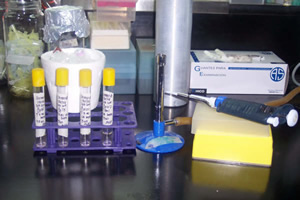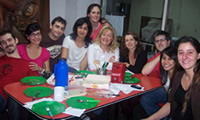Discovering a Global Perspective to Research
Student Researcher Returns To Lab After a Bout of Illness
By Doreen Carpio
Doreen Carpio is a fourth year undergraduate biological science major taking part in the Minority Health and Health Disparities International Research Training Program. This summer she is in Argentina, where she is conducting antibacterial resistance research under Angeles Zorreguieta at the Instituto Fundacion Leloir. This is one of a series of blogs she is writing of her experience.

Microbiology en espanol!
Antibacterial resistance is a very important matter in our everyday lives.
When you are affected by something caused by bacteria, you may go to the doctor's office hoping to leave with a prescription for an antibiotic that will rid you of the infection caused by that bacteria. However, what affect would the antibiotic have on your infected body if the bacteria found a way to resist what was originally meant to kill it? Bacteria are very interesting and capable organisms, in that they have found and perfected several mechanisms by which they can counteract the affect of antibiotics (actually meaning "against" "fit for life") on their means of living.

This is what my lab desk commonly looks like throughout the day
Therefore, antibacterial resistance is becoming a cause for concern throughout the whole world. For example, common infectious diseases such as tuberculosis and pneumonia can no longer be treated by common antibiotics like penicillin and rifampicin on account of this issue.
There are a wide variety of factors that have added to this issue of antibacterial resistance, including the over usage of certain commercialized antibacterial products (I like to call it the antibacterial movement), the issue of misdiagnosing and prescribing antibiotics that are not needed, the act of ingesting these antibiotics that are not needed or do not target the true underlying problem, as well as many others.
This, in a broad sense, is what my research at Fundacion Instituto Leloir is attempting to explore.
Overall, I have gained much knowledge and practice with certain concepts and techniques regarding microbiology in the last seven weeks that I have been here. I feel privileged to be working under such experienced and intelligent people in my lab, and I cannot wait to see what results and conclusions my last few weeks in Buenos Aires has to offer me, research-wise.
Aside from my interesting adventures in lab, I have had quite a rough last couple of weeks because I caught an Argentinean virus.

Everyone in the lab celebrating el cumpleanos de Alfonso
It all started with the weakening of my normally upbeat stance, then it moved to a fever that took its toll right in the center of my bones, a devastating cold that left me feeling groggy and cloudy-headed for several days, a period of time in which I sounded like a pre-pubescent male going through voice changes (yes, I lost my voice), and, I hope, is concluding with a consistently dry and raspy cough that reoccurs every 15 seconds or so.
So, as a whole, a pretty darn bad virus!
When several lab mates and acquaintances have approached me in the last two weeks, they would see my symptoms and downtrodden posture, tilt their head slightly to the side in sympathy and ask: "Estas enferma? Es Gripe?"
I don't know! What is Gripe!?!

Maybe one of the reasons why I have not recovered from gripe as quickly as I had hoped? Like a true fan, I showed up to the Muse concert at Teatro Gran Rex with a packet of Bayasprina and cough drops in my pocket
After rushing home, typing in "google.ar" into my search bar and expectantly waiting the results of "gripe," I have come to learn that "gripe" roughly translates to "influenza virus" in English.
I definitely ended that Google search with a sigh of relief. The highlight of my sick days here in Argentina was when I walked to the local farmaCity (Ed.- a drugstore chain in Argentina) and spent hours trying to figure out what proper medications to buy and how to ingest these medications properly, complete with an English-Spanish dictionary in hand for everyone to observe my obvious confusion as a foreigner. It was fun!
In conclusion, working in a lab under intelligent and knowledgeable individuals has been a rewarding experience thus far; the abduction of the gripe virus over my body has slowed down my progress in blogs, but not in lab; Argentinean medication has a cold version of Theraflu that is quite tasty; and the duration of gripe affecting my body may have elongated due to the fact that I do not understand the concept of bed rest.

